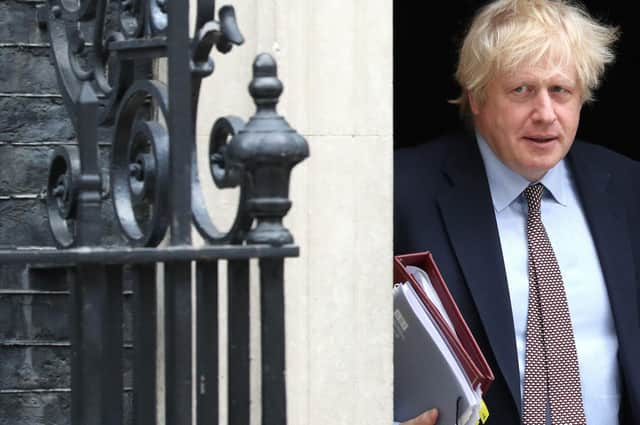Boris Johnson u-turns to allow proxy votes by shielding MPs


Less than 24 hours after Leader of the Commons Jacob Rees-Mogg said MPs who couldn’t return to parliament for medical reasons would not be able to take part in votes, he was overruled by the Prime Minister.
There was widespread anger yesterday as MPs had to form a queue nearly 1.5km long, snaking around the parliamentary estate inside and outdoors, to walk through the Commons chamber for the first socially-distanced physical vote.
Advertisement
Hide AdAdvertisement
Hide AdThe process initially took nearly 45 minutes, although it sped up at later attempts.
Around 200 MPs were not present because they or a family member are shielding, or due to difficulties in securing childcare and transport.
Ministers have insisted that physical sittings are essential to allow proper scrutiny of the government, although 31 Conservative MPs rebelled yesterday seeking to extend hybrid virtual parliamentary debates that had taken place during lockdown.
With Scottish MPs facing particular difficulties in travelling to and from Westminster every week, with Orkney and Shetland Liberal Democrat member Alistair Carmichael saying he has relocated to London for the next two months in order to take part in debates and votes.
Mr Rees-Mogg had already made a concession in agreeing to allow shielding MPs to continue to take part in debates and put questions remotely, but insisted that they would only be able to be ‘paired’ in votes - an informal process where an MP voting the opposite way abstains, cancelling out an opposing vote.
But at Prime Minister’s Questions, Mr Johnson was challenged by Labour leader Sir Keir Starmer, who said: “The scenes yesterday of MPs queuing to vote, and members being unable to vote, were frankly shameful.
“This should not be a political issue. Members on all sides know that this is completely unnecessary and unacceptable.
“If any other employer behaved like this, it will be a clear and obvious case of indirect discrimination under the Equalities Act - a clear and obvious case.
Advertisement
Hide AdAdvertisement
Hide Ad“So can I urge the prime minister to stop this. And to continue to allow online voting and the hybrid parliament to resume?”
Mr Johnson defended putting a halt to virtual proceedings, telling Mr Starmer that “he needs to consider what is really going on throughout the country where ordinary people are getting used to queuing for long periods of time to do their shopping, or whatever it happens to be.
“I do not think it unreasonable that we should ask parliamentarians to come back to this place and do their job for the people of this country.”
But the Prime Minister added: “I apologise to colleagues for the inconvenience, and I apologise to all those who face particular difficulties because they're shielding, or because they are elderly, and the change we're making today is that they should be able to vote by proxy.”
A message from the Editor:Thank you for reading this story on our website. While I have your attention, I also have an important request to make of you.
With the coronavirus lockdown having a major impact on many of our advertisers - and consequently the revenue we receive - we are more reliant than ever on you taking out a digital subscription.
Subscribe to scotsman.com and enjoy unlimited access to Scottish news and information online and on our app. With a digital subscription, you can read more than 5 articles, see fewer ads, enjoy faster load times, and get access to exclusive newsletters and content. Visit https://www.scotsman.com/subscriptions now to sign up.
Our journalism costs money and we rely on advertising, print and digital revenues to help to support them. By supporting us, we are able to support you in providing trusted, fact-checked content for this website.
Joy Yates
Editorial Director